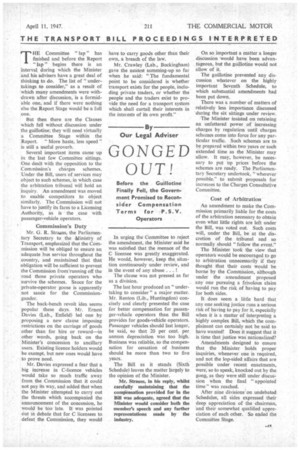GONGED OUT!
Page 47

If you've noticed an error in this article please click here to report it so we can fix it.
THE Committee " lap " has finished and before the Report "lap " begins there is an interval during which the Minister . and his advisers have a great deal of thinking to do. The list of "undertakings to consider," as a result of which many amendments were withdrawn after discussion, is a formidable one, and if there were nothing else the Report Stage would be a full one.
But then there are the Clauses which fell without discussion under the guillotine; they will need virtually a Committee Stage within the Report. "More haste, less speed" is still a useful proverb.
Several important items came up in the last few Committee sittings. One dealt with the opposition to the Commission's charges schemes. Under the Bill, users of services may object to such schemes, in which case the arbitration tribunal will hold an inquiry. An amendment was moved to enable competitors to object similarly. The Commission will not have to justify its fares to a Licensing Authority, as is the case with passenger-vehicle operators.
Commission's Duty Mr. G. R. Strauss, the Parliamentary Secretary to the klinistry of Transport, emphasized that the Commission will be obliged to ensure an adequate bus service throughout the country, and maintained that that obligation will be sufficient to prevent the Commission from running off the road those private operators who survive the schemes. Sauce for the private-operator goose is apparently not sauce for the Commissiongander.
The back-bench revolt idea seems popular these days. Mr. Ernest Davies (Lab., Enfield) led one by proposing a new clause imposing restrictions on the carriage of goods other than for hire or reward—in other words, going back on the Minister's concession to ancillary users. Existing licence holders would be exempt, but new ones would have to prove need.
Mr. Davies expressed a fear that a big increase in C-licence vehicles would take so much traffic away from the Commission that it could not pay its way, and added that when the Minister attempted to carry out the threats which accompanied the announcement of the concession, he would be too late. It was pointed out in debate that for C licensees to defeat the Commission, they would have to carry goods other than their own, a breach of the law.
Mr. Crawley (Lab., Buckingham) gave the neatest summing-up so far when he said: "The fundamental point to be considered is whether transport exists for the people, including private traders, or whether the people and the traders exist to provide the need for a transport system which shall curtail their interests in the interests of its own profit."
In urging the Committee to reject the amendment, the Minister said he was satisfied that the menace of the C licensee was greatly exaggerated. He would, however, keep the, situation continuously under review, and in the event of any abuse . . . !
The clause was not pressed as far as a division.
The last hour produced an "undertaking to consider" a major matter. Mr. Renton (Lib., Huntingdon) concisely and clearly presented the case for better compensation for passenger-vehicle operators than the Bill provides for goods-vehicle operators. Passenger vehicles should last longer, he said, so that 20 per cent. per annum depreciation was too high. Business was reliable, so the compensation for cessation of business should be more than two to five years.
The Bill as it stands (Sixth Schedule) leaves the matter largely to the opinion of the Minister.
Mr. Strauss, in his reply, whilst carefully maintaining that the comeensation provided for in the Bill was adequate, agreed that the Minister would consider both the member's speech and any further representations made by the industry. On so important a matter a longer discussion would have been advantageous, but the guillotine would not allow of it.
The guillotine prevented any discussion whatever on the highly important Seventh Schedule, to which substantial amendments had been put down.
There was a number of matters of relatively less importance discussed 'during the six sittings under review.
The Minister insisted on retaining an unfettered power of increasing charges by regulation until charges schemes come into force for any particular traffic. Such schemes are to be prepared within two years or such extended time as the Minister may allow. It may, however, be necessary to put up prices before the schemes are ready. The Parliamentary Secretary undertook, "wherever possible." to submit proposals for increases to the Charges Consultative Committee.
Cost of Arbitration An amendment to make the Commission primarily liable for the costs of the arbitration necessary to obtain even what little rights are left under the Bill, was voted out. Such costs will, under the Bill, be at the discretion of the tribunal and so .normally should "follow the event."
The Minister took the view that operators would be encouraged to go to arbitration unnecessarily if they thought that their costs would be borne by the Commission, although under the amendment proposed any one pursuing a frivolous claim would run the risk of having to pay for both sides.
It does seem a little hard that any one seeking justice runs a serious risk of having to pay for it, especially when it is a matter of interpreting a highly complex Bill, which the complainant can certainly not be said to have wanted! Does it suggest that it is time that justice was nationalized?
Amendments designed to ensure that the Minister holds proper inquiries, whenever one is required, and not the lop-sided affairs that are possible under recent enactments, were, so to speak, knocked out by the gong, as they were still under discussion when the final "appointed time" was reached.
After nine divisions on undebated Schedules, all sides expressed their deep appreciation of the chairman, and their somewhat qualified appreciation of each other. So ended the Committee Stage.




































































